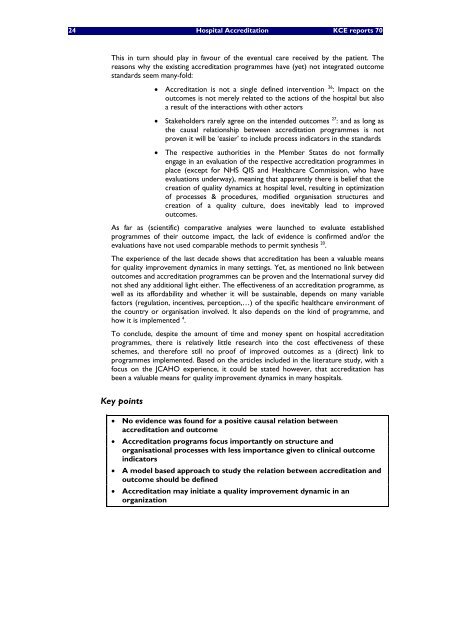Vergelijkende studie van ... - KCE
Vergelijkende studie van ... - KCE
Vergelijkende studie van ... - KCE
Create successful ePaper yourself
Turn your PDF publications into a flip-book with our unique Google optimized e-Paper software.
24 Hospital Accreditation <strong>KCE</strong> reports 70<br />
This in turn should play in favour of the eventual care received by the patient. The<br />
reasons why the existing accreditation programmes have (yet) not integrated outcome<br />
standards seem many-fold:<br />
• Accreditation is not a single defined intervention 26 : Impact on the<br />
outcomes is not merely related to the actions of the hospital but also<br />
a result of the interactions with other actors<br />
• Stakeholders rarely agree on the intended outcomes 27 : and as long as<br />
the causal relationship between accreditation programmes is not<br />
proven it will be ‘easier’ to include process indicators in the standards<br />
• The respective authorities in the Member States do not formally<br />
engage in an evaluation of the respective accreditation programmes in<br />
place (except for NHS QIS and Healthcare Commission, who have<br />
evaluations underway), meaning that apparently there is belief that the<br />
creation of quality dynamics at hospital level, resulting in optimization<br />
of processes & procedures, modified organisation structures and<br />
creation of a quality culture, does inevitably lead to improved<br />
outcomes.<br />
As far as (scientific) comparative analyses were launched to evaluate established<br />
programmes of their outcome impact, the lack of evidence is confirmed and/or the<br />
evaluations have not used comparable methods to permit synthesis 20 .<br />
The experience of the last decade shows that accreditation has been a valuable means<br />
for quality improvement dynamics in many settings. Yet, as mentioned no link between<br />
outcomes and accreditation programmes can be proven and the International survey did<br />
not shed any additional light either. The effectiveness of an accreditation programme, as<br />
well as its affordability and whether it will be sustainable, depends on many variable<br />
factors (regulation, incentives, perception,…) of the specific healthcare environment of<br />
the country or organisation involved. It also depends on the kind of programme, and<br />
how it is implemented 4 .<br />
To conclude, despite the amount of time and money spent on hospital accreditation<br />
programmes, there is relatively little research into the cost effectiveness of these<br />
schemes, and therefore still no proof of improved outcomes as a (direct) link to<br />
programmes implemented. Based on the articles included in the literature study, with a<br />
focus on the JCAHO experience, it could be stated however, that accreditation has<br />
been a valuable means for quality improvement dynamics in many hospitals.<br />
Key points<br />
• No evidence was found for a positive causal relation between<br />
accreditation and outcome<br />
• Accreditation programs focus importantly on structure and<br />
organisational processes with less importance given to clinical outcome<br />
indicators<br />
• A model based approach to study the relation between accreditation and<br />
outcome should be defined<br />
• Accreditation may initiate a quality improvement dynamic in an<br />
organization

















